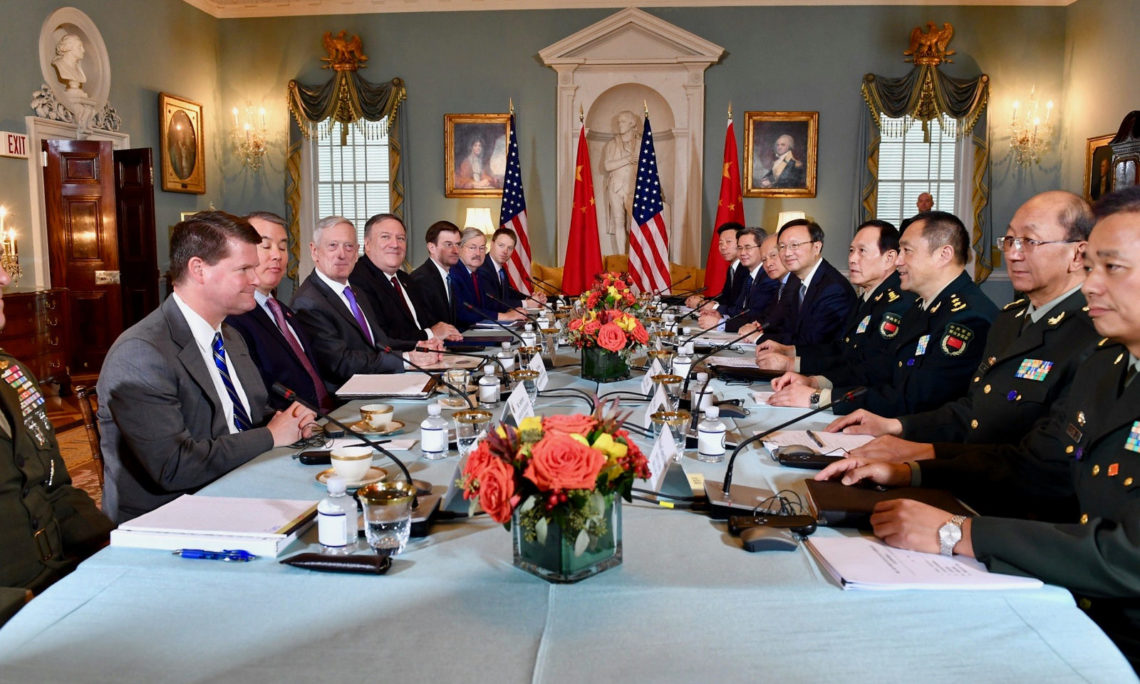AIT Official Text #: OT-1840
November 9, 2018
Remarks by Secretary of State Michael R. Pompeo
U.S.-China Diplomatic and Security Dialogue
Washington D.C.
November 9, 2018
Good afternoon, everyone. Secretary Mattis and I are pleased to welcome Director Yang and Minister Wei to the State Department for the second U.S.-China Diplomatic & Security Dialogue. Welcome.
Presidents Trump and Xi launched this dialogue as a venue for candid discussions on issues affecting the U.S.-China relationship, and we advanced these discussions today in preparation for the upcoming meeting between our two leaders at the G20.
As President Trump has made clear, the United States seeks a constructive, results-oriented relationship with China grounded in fairness, reciprocity, and respect. Personal relationships of trust and candor will go a long way in achieving these ends.
This is why I was truly pleased to engage in friendly, constructive dialogue with Director Yang and Minister Wei today on a host of opportunities and challenges between our two countries.
Even as our countries confront important differences in the bilateral relationship between the nations, our cooperation remains essential on many, many central issues. For example, I expressed in our meeting today the importance of remaining united in the pursuit of the final, fully verified denuclearization of North Korea as agreed to be Chairman Kim in Singapore. This means maintaining pressure through the continued strict enforcement of all UN Security Council resolutions.
China’s cooperation in enforcing those UN Security Council resolutions will help achieve meaningful breakthroughs on this important denuclearization issue.
I also expressed our desire to see further cooperation from China in addressing Iran’s nuclear missile programs and other malign activities. We hope to work with the Chinese Government and Chinese energy companies in this regard. Bringing Iran’s oil export revenues to zero is a critical component of this campaign, and we discussed this today.
We also discussed how we can strengthen the commitments made at last year’s dialogue, including deepening bilateral exchanges on military and security issues and risk reduction in times of crisis.
In addition to these opportunities to strengthen our cooperation, I was forthright in addressing significant differences between our nations.
I was clear, for example, that we have continued concern about China’s activities and militarization in the South China Sea. We pressed China to live up to its past commitments in this area.
Regarding our strong ties with a democratic Taiwan, I reiterated the U.S. policy has not changed and that we are concerned about China’s increasing efforts to coerce others, constraining Taiwan’s international space. And finally, I stated the United States and the international communities will continue to express our concerns with respect to China’s repression of religious groups – Christian, Buddhists, and 800,000 to possibly millions of Muslims that have been denied their freedoms.
In closing, I want to state that this was an incredibly productive conversation. The United States is not pursuing a Cold War or containment policy with China.
Rather, we want to ensure that China acts responsibly and fairly in support of security and prosperity of each of our two countries.
I hope that our discussions today as well as the upcoming discussions between Presidents Trump and Xi will yield tangible results towards this goal. I am confident that they will.
Thank you. And I’d now like to invite Director Yang to make his statement. Thank you, sir.
















![Video Thumbnail [Recovered]-01](../wp-content/uploads/sites/269/Video-Thumbnail-Recovered-01-1-750x450.jpg)





